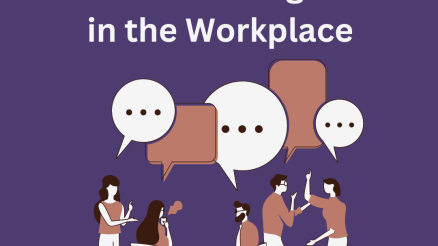Empathy in the workplace is important because it’s all about human connections which make or break a workplace.
If there are strong human connections at the workplace, it will contribute to strengthening positive workplace culture and improving team performance.
In this article, we look at what it means to be empathic. We’ll look at how a few simple activities can help us form stronger connections, foster an open and honest culture, and positively impact our colleagues’ emotional well-being and productivity.
What is Empathy in the Workplace?
Empathy, in its most basic form, is the ability to understand and relate to others’ emotions and perspectives.
Empathy in the workplace simply means that everyone is able to empathetic bonds with one another, which ultimately improves relationships and performance.
Empathy is often confused with sympathy.
Sympathy means being able to compassionate about others. Empathy is more than that which is ability to feel emotions, relate to thoughts and experience of others.
When you (as an employee) demonstrate empathy, you obtain a sense of what it’s like to walk in another’s shoes, you acquire a sense of their experience and the feelings they may be experiencing, and you help them through those difficult situations.
Empathy in the workplace, which is a crucial component of emotional intelligence and leadership efficiency, improves human connections in general and can result in more effective communication and beneficial outcomes in the workplace.
Building empathy in the workplace is critical for an organization to sustain a healthy work culture. It necessitates a deliberate organizational effort.
Examples of Empathy in the Workplace
Empathy in the workplace can be explained through the following real-life examples:
- The leadership of a corporation demonstrates empathy by sincerely listening to employee feedback and adapting it to their business procedures.
- Training and Development teams would empathize with Customer Support teams by developing effective learning programs that enable customer service employees to perform better and provide outstanding service.
- During brainstorming sessions, colleagues listen respectfully, appreciate their teammates’ varying views, and share their own points of view without offending others or turning the discussion into a debate.
- Managers would empathize with their employees who were having a difficult day and offer them a day or a week off.
- A recruiter understands the frustrations of a candidate who needs to rearrange an interview at the last minute due to unforeseen circumstances.
Types of Empathy at the Workplace
Empathy is divided into three basic categories:
Cognitive Empathy
The ability to grasp what another person is thinking or feeling is known as cognitive empathy. It doesn’t require the observer to be emotionally involved, but it does demand an awareness of what the other person is thinking.
Knowing what their team members are feeling helps managers to motivate them. Similarly, sales representatives can make their right plan of action if they assess customers’ mood and know what they are thinking.
Emotional Empathy
Emotional empathy is the ability to share another person’s feelings and hence have a better understanding of that individual. Because it impacts or transforms you, it’s frequently referred to as “affective empathy.”
This level of empathy might be overpowering for some of us. Empathic persons feel people’s issues or pain, which can be harmful to their emotional well-being.
Compassionate Empathy
Compassionate empathy refers to recognizing another person’s emotional pain and making efforts to relieve it.
For example, one of your team members is frustrated or feeling sad because he/she have missed the deadline to submit a report. You can listen his/her problem and provide practical advice on what happened and how they might improve their performance in the future. And you can also provide his/her support in completion of that report.
Benefits of Empathy in the Workplace
There are many benefits of being empathic at work and some of them are explained below:
1. Strengthens Workplace Culture
Empathy can help you become a better team player and collaborator. When each one at workplace understand other people’s points of view, they will have a good relationship.
This all contributes to having a strong and positive workplace culture.
2. Makes Communication effective
Empathy improves your ability to adapt your communication style to the person or group with whom you are interacting.
If you’re presenting a presentation or talking to a supervisor or a customer, you can modify your style of communication by knowing what another person is thinking or feeling in any given situation.
3. Encourages Creative Thinking
When you apply empathy in the job, you might be able to come up with more innovative solutions. Your organization may urge you to think about your audience’s point of view or the most significant needs of your target customers as a group.
Understanding a product or service from the perspective of the customer can help you spot problems or opportunities you hadn’t considered previously, and you’ll be more likely to try out new ideas.
4. Increases Productivity
Empathy in the workplace promotes collaboration and good relationships among employees who become more motivated and committed towards their work.
A workplace without empathy often lead to isolation of team members and ultimately more toxicity and negativity. This all produces less motivated employees who are less productive with their work.
5. Increases Customer Service
Since you can predict customer demands and requirements when you have empathy, you can increase your customer service skills. When a consumer calls to complain about an issue, they may be angry and want you to listen to them.
You can demonstrate to them you value what they have to say by allowing them to tell you all the information before answering. Clients and employees who feel appreciated are more likely to listen to your advice.
6. Enhances Sales and Investment
Empathy in the workplace can help you better understand your current and prospective stakeholders’ motivations, such as clients, consumers, and investors.
Investors may have different reasons for choosing companies, so research your possible investors to demonstrate empathy. Look into their work background to see if you have any parallels. Use their knowledge and experience to influence their decisions during your talk.
How to Build Empathy in the Workplace
1. Practise active Listening
Active listening is one of the most effective ways to demonstrate empathy in the workplace. It makes it easier for people sharing information and their feelings with other colleagues.
When people show their ability to actively listen to what others are saying then other people will be more interested and willing to share their thoughts, ideas and work with them.
Active listening is a skill that can be learned through having trainings and then practising frequently at the workplace. Managers and leaders should invest in trainings of their employees to learn different techniques and methods of active listening.
2. Ask questions
You may better know feelings of your team member and understand problems by asking right questions. When you ask questions, this will make more connected you to other person who might open up to explain things further.
For example, if your colleague asks your help to complete his job but you have no knowledge about that job. Instead of saying no to your colleague you may ask questions that how you help you can help him/her in things that you know.
So, asking questions helps you to give solutions to others.
3. Put yourself in other’s shoes
Maintain an open mind. Don’t pass judgment so quickly. Even the smartest people suffer. Try to put yourself in the shoes of a co-worker or a new hire when you see them struggling in a circumstance. You know, we’ve all been in similar situations.
Furthermore, you may be unaware of how distinct your co-worker’s functions and obligations are. This viewpoint will aid you in taking control of the issue and responding more effectively.
4. Recognize your own hidden biases
We all have some preconditions and biases that can influence how we communicate and react in specific situations.
For example, if you are often depressed and frustrated or find yourself far away, it might considerably hinder your capacity to develop healthy relationships.
Our inclinations often prevent us from changing our minds for everyone. For example, you might react differently to various people in comparable situations. Your personal biases may cause you to empathize with one individual while being apathetic to the other.
As a result, recognizing our own biases and not allowing them to influence our choices is critical.
Conclusion
Organizations should show their employees that they are valued by practising empathy in the workplace. Leaders must understand value of being empathic and how it would contribute to well-being of employees and their productivity. Knowing benefits of empathy, leaders should learn how to promote it by adopting simple techniques which have great impact on over culture at workplace.



